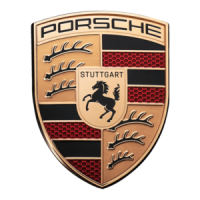Fuel, Exhaust & Engine Electrics
Page 2.2
The most important technical components of the direct fuel
injection system are:
• The fuel low pressure system.
• The fuel high pressure system.
• The fuel rail (central high pressure distribution pipe).
• The fuel injectors.
• Modifications to the cylinder head.
• Special recessed pistons for the relevant engine.
Porsche is using direct fuel injection (DFI) for the first time in its new
generation of Cayenne engines. DFI offers numerous advantages
compared to intake manifold injection. The main objective here is to
achieve an air/fuel mixture adapted specifically to the respective
operating and charge states of the engine using an injection system and
mixture formation. This provides the perfect solution for meeting the
various demands relating to economy, power, vehicle handling and
emissions.
With direct fuel injection, the fuel is injected directly into the combustion
chamber and mixture formation takes place almost completely in the
combustion chamber.
The direct fuel injection system used in the new Cayenne models
is characterized by the following:
• Homogeneous operation.
• Better cylinder filling.
• Reduced knock sensitivity.
• Higher compression ratio.
• High pressure stratified charge ignition.
• Dual injection.
The direct fuel injection system used in the new Cayenne engines is
based on homogeneous operation. The mixture of air and fuel is distrib-
uted as evenly as possible in the combustion chamber, thereby allowing
optimal combustion. With this system, the fuel is injected directly into
the combustion chamber at a pressure of up to 1740 psi (120 bar).
Within the injector, the fuel jet creates a vortex (rotated around the longi-
tudinal axis). This rotation forms a conical cloud of fuel. The fine
atomization produced by this allows faster evaporation of the fuel. The
fuel evaporation process takes the required heat energy from the air,
thereby cooling the air. This reduces the cylinder charge volume and
additional air is drawn in through the open intake valve, which in turn im-
proves cylinder filling. The reduced temperature level also helps to meet
the prerequisites for the higher compression ratio in all new Cayenne
engines since knock sensitivity has been improved. The higher compres-
sion ratio in turn increases engine efficiency.

